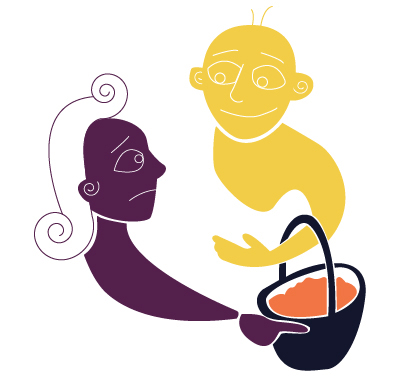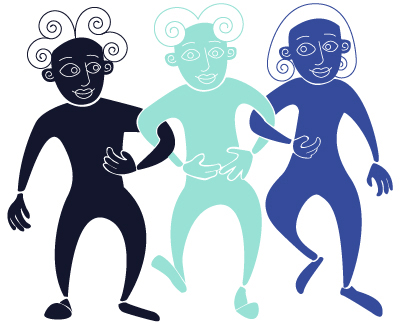Making it Horrible
O ur three Filipino girls skip into the Tuesday storytelling group and sit in the front row with their arms linked. Their mothers work at Baycrest Centre for Geriatric Care and the girls like to visit when school’s out. They feel quite at home with the bubbies and zaidies in their walkers and wheelchairs. The girls are seven, eight, and nine years old; they bring the average age of the group down by fifty years. “Why was six afraid of seven?” I ask them. They shrug. “Because seven ate nine.” The riddle earns a small laugh.
The other people in the room are patients from the hospital, residents of the long-term care facility, personal support workers, medical staff, family members. We come from Poland, Manila, South Africa, Winnipeg, Montreal, the US, Jamaica, Trinidad, and Kensington Market. A motley and multicultural storytelling tribe, we gather every Tuesday to exchange life-stories and folktales.
We also like to share proverbs and sayings. One woman remembers how her grandmother, when she started dating, used to say: “Every hinkadink finds a shtinkadink.” As I look at the loving and indomitable men and women pushing their silent spouses’ wheelchairs, it occurs to me that if you’re really, really lucky in the shtinkadink department, you may find a hinkadink who keeps your stories alive even when you can no longer tell them yourself. The Filipinos in the group like to relate a famous Tagalog proverb: “If you forget where you come from, you cannot reach your destination.” It is an apt piece of wisdom for people who have travelled so far to look after other people’s babies and bubbies, sending their remittances home and using Skype to see the faces of those they love. I recently shared a proverb from Zimbabwe: “The bag that is heaviest contains the seeds.” That one hit home for the listeners coming from the psychiatry program and rehab floors. There’s solace in the idea that in your bag you may be carrying, not only troubles, but also the seeds of transformation. Those seeds can seem the heaviest of all, but they make change possible.
On the day when our three girls joined us this summer, I told a folktale about a strange village.
A man was lost in the desert. A kind woman rescued him, led him to her village, nursed him back to health, and married him. He quickly discovered that this was an unusual village. Everything was free, but on one condition. Whenever you took what you wanted or desired, the provider would ask, “For today?” and the people answered, “Yes, for today and today only.”
One day the man saw strawberries in the marketplace. Worried that his favourite fruit may not be available again, he began to load up. “For today?” asked the fruit merchant. “Yes!” said the man, as he stuffed the strawberries into his pockets, cuffs, sleeves, and hat. He ran home and put the lovely fruit out for his wife to see. “Nice,” she said. “When’s the party?” “There is no party,” he said, “this is all for us. What we don’t eat today, we can have tomorrow.” “Tomorrow?” she murmured. “You’re a tomorrow person … ?” The strawberries had already begun to rot in their baskets and boxes. She banged a frying pan on the gate and the neighbours came running angrily towards the man. He turned and fled and ran back into the surrounding desert, collapsing on the sand. When he woke up, the village had disappeared.

Because Baycrest is a Jewish institution, after the story came the debate. Which is more important: to live for today or to plan for tomorrow? The eight-year-old girl giggled. “Tomorrow,” she said, “because tomorrow we’re going to Wonderland and playing in the water park.” The older listeners mostly voted for the live-for-today perspective. Unlike the kids, our rollercoaster days are behind us and, even if we still feel like daredevils, you can only go so fast in your wheelchair. At our age you don’t buy green bananas; who knows how many tomorrows there will be? A man spoke about a friend going in for an operation the next day. The group agreed that today, not tomorrow, is when he needs to tell his friend how much he cares for him. Albert, who’s been coming with his wife Arlene since the storytelling began two-and-a-half years ago, began to sing Tomorrow is Forever, from one of his favorite movies. Then we all remembered the Jewish prayer: God be blessed, day by day.

Near the end of the session I turned to the girls and asked if they’d like to hear one more story. They nodded. “Can you tell a story about us?” asked the eight-year-old, who seemed to be the ringleader.
Now, although I work as Baycrest’s storyteller-in-residence, I am not the world’s best improviser. When my own sons were very young I’d often fall asleep in the middle of my own yarns. A voice from the crib would chirp, “Daddy, what happened to the flying horse?” “Um … what flying horse?” But then I remembered the Canadian proverb “Never say ‘whoa’ in a mudhole,” and started to make up a story for Samantha, Isabel, and Sophia.
There were once three girls named Samantha, Isabel, and Sophia. They used to walk down the sidewalk with their arms linked together, just like three princesses. One day they went to Canada’s Wonderland. They had chips, funnel cake, and hot dogs. Then they went to the water park and went down the slide, played in the waterfall, and splashed water on each other.
I thought the story was going along okay until Samantha spoke up. She said, “Dan … could you not tell about things we like? Can you make it horrible?”
Make it horrible? I knew what she meant. The story was boring, nice, ordinary; way too un-horrible. I had forgotten the urgent and mysterious secret of this ancient art of storytelling: the listener is the hero of the story. Dylan Thomas, describing his love of poetry, wrote that art is how we make this ephemeral life “dangerous, great, and bearable.” My girls wanted to hear a story about themselves that was dangerous, great, and horrible.
The elders in the room laughed. They know from horrible. They have made meaningful, memorable lives despite the chaos and violence of war, despite poverty and anti-semitism, despite their current struggles with the frailties of old age. The Filipino mothers of our girls know about the pain of leaving home and making a new life in a new land. But the group also knows how to laugh at life’s absurdities and tsures (Jewish word for troubles). One of our Holocaust survivors went with her private companion, who also happened to be Polish, to the hairdresser. The hairstylist saw that they both had tattoos, one a number on the inside of an eighty-five year old arm, the other a soaring bird on a young woman’s shoulder. “Cool!” she exclaimed, “You both have tattoos!” My friend, a woman of great wit and forbearance, smiled ruefully when this story was retold in the group by her private companion.
I rebooted the girls’ story knowing the stakes had to be a lot higher. I took the girls up the Drop Zone.
Three friends went to Canada’s Wonderland (I kept the beginning). They went on the scariest ride in the park. Even though they were terrified, they linked arms and sat tightly together as the cabin started to go up. After ten meters they looked down and saw their parents far, far below. After another ten meters they could see all the way to the CN Tower. After another ten meters they started to feel really sick. All of those funnel cakes didn’t feel so good anymore. After the next hundred meters they were so high they could see Manila. They could even see their grandparents. (“No,” corrected Sophia, pointing to her best friend. “She doesn’t have a grandfather anymore.”) Then they went even higher, all the way to the clouds. Then the cabin began to fall and the girls screamed and it was horrible! When they finally landed they all agreed to go straight to the water park.
My listener-protagonists had linked arms in their seats as they – i.e. their story personae – ascended to the terrifying heights and dropped precipitously back down again. As their fictional avatars staggered from the ride towards the water park, the girls agreed that the story had been satisfyingly horrible.
Martin Buber describes villagers listening to the stories of the Baal Shem Tov, the great Hasidic rabbi and master storyteller: “under the touch of its words, the secret melody of each person was awakened …” If the listener is the hero of every story, then the story must reflect us as we could be, not merely as we are. If my three young champions had done nothing but eat funnel cake and jump around on the splashpad how would they ever prove themselves? If you don’t face your dragon, how will you ever discover the courage you carry, like a secret melody, inside yourself?
By the end of the session, the group decided that stories teach us to honor yesterday, keep hoping for tomorrow, and always, always savour our dangerous, great, and even sometimes horrible todays.
©2018 STORYCARE. Website by furia.ca